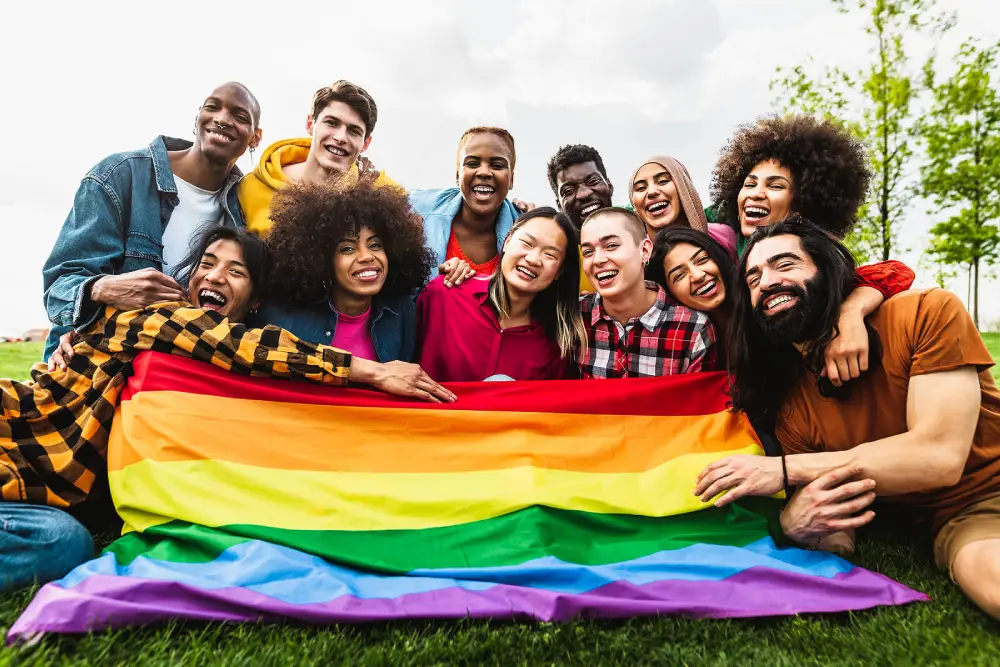Navigating the complexities of the world as an LGBTQ+ individual can often feel like an uphill battle. You might find yourself grappling with societal prejudices, internal struggles, or even personal acceptance. It’s not easy and certainly not a journey that should be undertaken alone. That’s where LGBTQ+ group therapy enters the picture, shining a ray of hope amidst the challenges.
In this comprehensive guide, we’ll explore the multifaceted realm of LGBTQ+ group therapy. We’ll uncover what it is, how it operates, and how it can serve as a sanctuary, facilitating growth, understanding, and self-love.
Contents
What Is Group Therapy For The LGBTQ+ Community?
 Group therapy for the LGBTQ+ community is a specialized form of therapy that addresses the unique mental health needs and societal challenges faced by individuals who identify as lesbian, gay, bisexual, transgender, or queer/questioning.
Group therapy for the LGBTQ+ community is a specialized form of therapy that addresses the unique mental health needs and societal challenges faced by individuals who identify as lesbian, gay, bisexual, transgender, or queer/questioning.
In these group therapy sessions, participants connect with others who share similar experiences, lending an atmosphere of mutual understanding and empathy that can be incredibly healing.
These groups focus on topics like identity exploration, self-acceptance, coming out, dealing with discrimination, and building healthy relationships.
Understanding the Need for LGBTQ+ Group Therapy
Being part of the LGBTQ+ community can be a deeply empowering experience, embracing one’s true identity and advocating for rights and acceptance. However, it’s important to acknowledge that it also comes with a unique set of challenges. These may range from societal prejudices, discrimination, and marginalization, to more personal issues like coming out, dealing with internalized negative attitudes towards one’s own sexuality, and grappling with identity issues.
Such challenges can often lead to higher levels of stress, anxiety, depression, and other mental health issues in LGBTQ+ individuals compared to their heterosexual peers. That’s where the critical role of LGBTQ+ group therapy comes into focus. This specialized form of treatment aims to address these unique issues in a supportive and understanding environment, reinforcing the fact that no one has to face these challenges alone.
How Therapy Can Help You?

Therapy, particularly LGBTQ+ group therapy, can be a game-changer in your journey towards self-understanding, acceptance, and overall mental well-being. Here’s how it can help you:
- Emotional Support: Therapy provides a safe and supportive space where you can openly discuss your feelings, experiences, and concerns. It can be incredibly validating to be heard and understood, especially by others who share similar experiences.
- Coping Strategies: Therapists can equip you with practical coping mechanisms and strategies to manage stress, anxiety, depression, and other mental health challenges. This can empower you to handle difficult situations more effectively.
- Self-Acceptance: One of the significant benefits of therapy is its potential to facilitate self-acceptance. It can help you embrace your identity, fostering a positive self-image and a stronger sense of self-worth.
- Improved Relationships: Therapy can also improve your relationships. It can help you develop healthier communication patterns, set boundaries, and build stronger connections with the people in your life.
- Resilience Building: Through therapy, you can cultivate resilience, enabling you to better withstand adversity and bounce back from setbacks.
- Understanding and Managing Emotions: Therapists can help you explore and understand your emotions better, providing you with tools to manage them effectively.
- Community Connection: Particularly in LGBTQ+ group therapy, a sense of community can be built. Sharing experiences and hearing others’ stories can reduce feelings of isolation and create a sense of belonging.
Remember, seeking help is not a sign of weakness; it’s a step towards resilience and well-being. Therapy is a powerful tool that can assist you in navigating life’s challenges, enhancing your mental health, and leading a more fulfilling, authentic life.
The Benefits of LGBTQ+ Group Therapy
 LGBTQ+ group therapy offers a multitude of benefits, not just from a psychological perspective, but also in terms of personal growth and community building. Let’s delve into some of these benefits:
LGBTQ+ group therapy offers a multitude of benefits, not just from a psychological perspective, but also in terms of personal growth and community building. Let’s delve into some of these benefits:
- Sense of Belonging: Group therapy provides an environment where individuals can connect with others who share similar experiences and identities, creating a powerful sense of belonging and acceptance.
- Shared Understanding: There’s a deep sense of shared understanding within these groups. When you express your struggles or triumphs, you’re speaking to people who genuinely ‘get it’. This mutual empathy can be incredibly healing.
- Peer Support: Along with professional guidance, group therapy offers peer support. You can give and receive advice, share coping strategies, and learn from each other’s experiences.
- Skill Development: Group therapy often involves various exercises and discussions that can help develop skills like effective communication, conflict resolution, emotional regulation, and resilience.
- Reduced Isolation: Sharing your journey with others can help combat feelings of loneliness and isolation, common among LGBTQ+ individuals who feel marginalized or misunderstood.
- Validation and Normalization: By seeing others with similar experiences, group therapy can validate your feelings and experiences, making you realize that you’re not alone.
- Confidence Building: Over time, group therapy can boost your confidence. It can help you become more comfortable with your identity and more capable of addressing challenges head-on.
Group therapy can play a crucial role in promoting mental health and well-being, fostering personal growth, and building stronger community connections within the LGBTQ+ community.
What Are The Disadvantages Of This Therapy?
 While LGBTQ+ group therapy has its unique benefits, it’s also essential to acknowledge potential disadvantages. Here are a few things to consider:
While LGBTQ+ group therapy has its unique benefits, it’s also essential to acknowledge potential disadvantages. Here are a few things to consider:
- Limited Individual Attention: In a group setting, the therapist’s attention is divided among several participants, which might limit the amount of personalized attention and care you receive.
- Privacy Concerns: Sharing personal experiences and feelings in a group setting can be intimidating, and there might be concerns about confidentiality.
- Group Dynamics: Sometimes, the dynamics within a group can become challenging. Conflicts might arise between group members, or you might find it difficult to connect with some members.
- Emotional Intensity: Listening to others’ stories can sometimes be emotionally overwhelming, especially if they trigger personal traumas or painful memories.
- Scheduling Conflicts: Group therapy sessions require coordinating the schedules of several individuals, which can sometimes lead to inconvenient session timings.
- One Size Doesn’t Fit All: Not everyone thrives in a group environment. Some individuals may find more benefit in a one-on-one therapy setting.
These potential disadvantages don’t necessarily mean that LGBTQ+ group therapy isn’t a good option. Instead, it highlights the importance of understanding your own needs and preferences in seeking therapy.
How to Find LGBTQ+ Group Therapy Sessions Near Me?
Finding the right LGBTQ+ group therapy can feel daunting, but with the right resources and methods, it becomes much more manageable. Here are some steps to help you locate an LGBTQ+ group therapy near you:
- Online Research: The internet is a vast resource for finding specific services, including LGBTQ+ group therapy. Search terms like “LGBTQ+ group therapy near me” or “LGBTQ+ mental health services in [your location]” can yield useful results.
- Local LGBTQ+ Organizations: Reach out to LGBTQ+ organizations in your area. They often have connections with local therapists and can guide you towards suitable group therapy options.
- Healthcare Providers: Discuss your needs with your healthcare provider. They may be able to refer you to a mental health professional who offers group therapy specifically for the LGBTQ+ community.
- Psychology Today’s Directory: You can use Psychology Today’s Therapy Directory, which allows you to filter search results based on your location and the type of therapy you’re seeking.
- Online Therapy Platforms: Consider online therapy platforms that offer group therapy options. These platforms can be a great resource, especially if there are limited local options or if you prefer the convenience of virtual sessions.
- University Counseling Centers: If you’re a student, your university’s counseling center may provide or be able to refer you to LGBTQ+-specific group therapy.
- Therapist Directories: Websites like GoodTherapy.org and the American Psychological Association’s therapist finder can also be valuable resources.
Remember, it’s crucial to ensure that any therapy or therapist you choose is licensed and has experience with LGBTQ+ issues.
Conclusion
Navigating life as an LGBTQ+ individual can be a journey filled with unique challenges and triumphs. It’s essential to remember that support is available, and you don’t have to face these experiences alone. LGBTQ+ group therapy stands as a beacon of hope to express feelings, share experiences, and learn from others.
While it comes with numerous benefits, it also has potential disadvantages. Regardless of the path you choose, remember that seeking help is a testament to your strength and a significant step toward self-understanding acceptance, and overall mental well-being.
Life may sometimes be challenging for people from LGBTQ community, but Online LGBTQ Counseling can help. Get experienced LGBTQ therapists at PrideMantra: Book a trial LGBTQ therapy session


